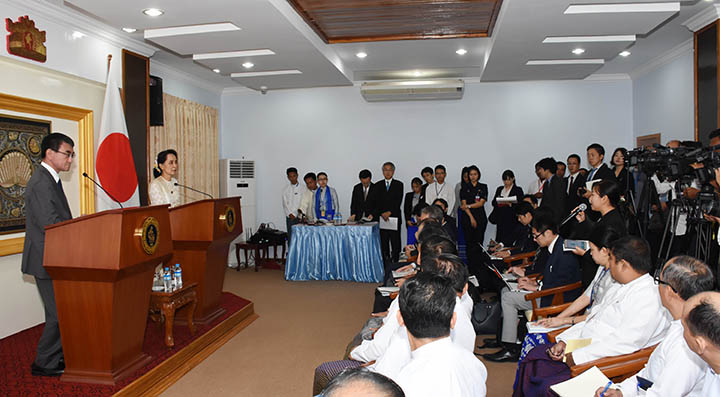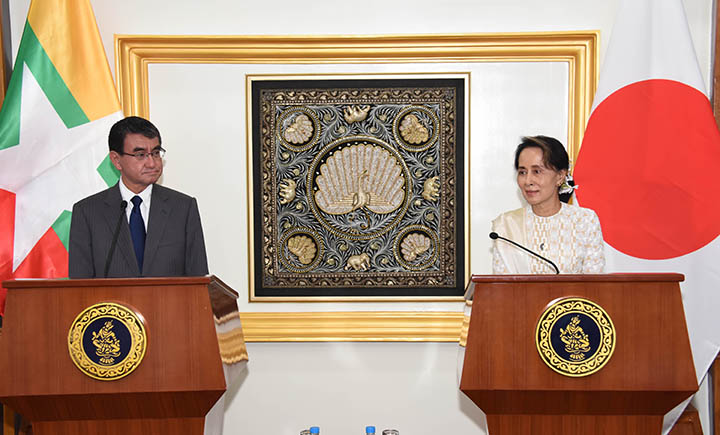State Counsellor Daw Aung San Suu Kyi and Japanese Foreign Minister Mr Taro Kono met at the Ministry of Foreign Affairs in Nay Pyi Taw on Wednesday morning.
During the joint press conference after the meeting, Mr Taro Kono said that he was pleased to visit Myanmar for the third time as foreign minister, and reaffirmed that Japan would continue providing assistance to support the State Counsellor and the Myanmar government in the economic, social and other sectors.
He also added that as a historic and partner country, Japan would provide assistance to Myanmar as she was encountering tough challenges, and said that peace and stability were essential for building a democratic state.

Mr Taro Kono also said that Japan would also support peace-making efforts in Myanmar with very firm determination. He added that in today’s meeting very productive discussion and exchange of views had been held with respect to the situation in Rakhine State.
He said he valued the efforts made by the Myanmar government to bring back the displaced persons from Bangladesh. He hoped that the Myanmar government would accelerate its implementation efforts including the work of the ICOE – Independent Commission of Enquiry.
Myanmar and Japan football teams would be facing each other in the second round of the 2022 World Cup Asian qualifying in the same group, and would be playing a match in Yangon in September.
In conclusion, he expressed his expectation for stronger ties of friendship between Myanmar and Japan through relations at a multi-dimensional level.
State Counsellor Daw Aung San Suu Kyi first expressed her appreciation to host the Japanese Foreign Minister, as she believed his visit reflected the friendly relations between the two countries.
She also acknowledged the continuous and steadfast assistance provided by Japan in the ongoing peace efforts of the Myanmar government.
The State Counsellor added she believed and understood Japan’s willingness to help Myanmar in solving the Rakhine issue that has grabbed global attention.
She also reiterated that the problem of the displaced persons was a bilateral issue between the two countries, but Myanmar appreciated Japanese kind offer to help in solving this problem.
Daw Aung San Suu Kyi also said that it was the goal of the Myanmar government to work for the safety, stability, progress and development of all citizens; to this end the Myanmar government has been striving for improvement in all fields such as social, economic and political. She expressed her deep appreciation for the assistance being provided by friends in Japan to help her in her efforts.
The State Counsellor said that she was eagerly waiting to watch the Myanmar-Japan football match that was about to take place in the near future as it could help strengthen the friendly relations between the two countries. No matter what the outcome of the football match might be, she believed that it would further strengthen the friendly and close relations between the two countries.
At this time when Myanmar was passing through a difficult period, she believed that the Japanese people who have passed through similar difficult times would have compassion and understanding for the Myanmar people. She concluded by saying that she sent warm greetings and good wishes to the Japanese people from this press conference.
In answering queries from the media, the State Counsellor clarified the fruitful results of the Thilawa Special Economic Zone in Yangon as well as other special economic zone being implemented in other states/regions; she also answered questions regarding the situation in the Rakhine state.
She said the Myanmar-Japan mega joint project was a very successful project. Since the majority of the companies in this project were Japanese companies, she said it was possible to forecast what kind of fruitful results could be obtained from such kind of bilateral cooperation. It had stimulated other states and regions to set up such special zones.
Meanwhile, the country was implementing only the Kyaukpyu and Dawei economic zones. She said work was initiated with these two economic zones and that not much progress had been made.
She also said the transportation infrastructure would be developed in Dawei first with Japanese assistance, and she was hopeful that similar success could be achieved in other states and regions also. She wanted them to implement such projects.
The State Counsellor remarked that the most tangible result of the Thilawa SEZ was the increase in job opportunities. The Myanmar people wanted job opportunities. She believed that Myanmar people were capable of creating their own destinies and working for their own development once they have jobs.
She said she was very encouraged by the success and progress of the Thilawa SEZ. She said it was important for the Myanmar people to have jobs opportunities as well as jobs with dignity. She concluded her answers to the media, with saying thanks to the Japanese companies in Thilawa SEZ.
Finally, Japanese Foreign Minister Mr Taro Kono said that in his discussions with the State Counsellor, he had commented on the extremely dire conditions of refugee camps on Bangladeshi side, and that he had urged the Myanmar government to take more strenuous efforts to bring back the displaced persons from Bangladesh. He added that the Japanese government would encourage and urge as much as possible.
He said he has also urged and stressed to the Myanmar government that it was important to conduct the Independent Commission of Enquiry in a transparent and credible manner.
Furthermore, he and informed the State Counsellor that yesterday it had been learnt that the Bangladesh government had already given approval for the ICOE to conduct investigations on the Bangladesh side.
The Japanese Foreign Minister concluded his answers with the promise to continue solving these problems by joining hands with the Myanmar government.—MNA
(Translated by Aung Khin)


